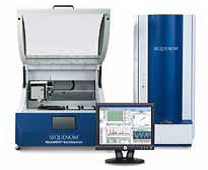- Genomics
- Transcriptomics
- Epigenomics
- Meta-omics
- Proteomics
- Single-Cell Sequencing
- Immune Repertoire Sequencing
- FFPE Samples

MassARRAY Genotyping
Cases
Technical Information
Contact Us / Wish List
The Sequenom MassARRAY iPLEX™ platform is based on Matrix Assisted Laser Desorption Ionization Time-of-flight Mass Spectrometry (MALDI-TOF MS) technology applied at BGI Tech for genotyping. With many advantages such as flexibility of experimental design and accurate genotyping results, this technology is also cost-effective, when testing hundreds or thousands of samples for tens of SNP loci. BGI is able to conduct HPV, HBV and cancer-related genes detection based on genotyping through the MassARRAY platform to meet the demands of high-throughput SNP analysis in the post genomic era. To date, BGI has genotyped more than 45,000 samples using the MassARRAY platform, and over half of them are clinical samples.
Matrix Assisted Laser Desorption Ionization Time-of-flight Mass Spectrometry (MALDI-TOF MS) technology applied at BGI Tech for genotyping. With many advantages such as flexibility of experimental design and accurate genotyping results, this technology is also cost-effective, when testing hundreds or thousands of samples for tens of SNP loci. BGI is able to conduct HPV, HBV and cancer-related genes detection based on genotyping through the MassARRAY platform to meet the demands of high-throughput SNP analysis in the post genomic era. To date, BGI has genotyped more than 45,000 samples using the MassARRAY platform, and over half of them are clinical samples.
Benefits:
- Highly sensitive: able to distinguish differences in quality of 1 Dalton molecules in support of DNA pooling technology. Moreover, the accuracy is >99.7%.
- Cost-effective: more cost effective when the number of SNPs is small, several dozens for example. In addition, there is no limitation for sample size.
- Flexible: The MassARRAY has been strategically designed from the ground up to meet your specific needs.
Frequent Mutations of Chromatin Remodeling Genes in Transitional Cell Carcinoma of the Bladder. Nature Genetics. 43, 875–878 (2011).
Transitional cell carcinoma (TCC) is the most common type of bladder cancer. Here we sequenced the exomes of nine individuals with TCC, followed by MassARRAY genotyping validation. Then we screened all the somatically mutated genes in a prevalence set of 88 additional individuals with TCC with different tumor stages and grades. In this study, we identified genetic aberrations of the chromatin remodeling genes (UTX, MLL-MLL3, CREBBP-EP300, NCOR1, ARID1A and CHD6) in 59% of our 97 subjects with TCC. Of these genes, we showed UTX to be altered substantially more frequently in tumors of low stages and grades, highlighting its potential role in the classification and diagnosis of bladder cancer.
Bioinformatics:
Quality Control Analysis
- Negative QC
- Positive QC
Sample Analysis
- Call cluster plot
- Success rate of SNP-calling for each sample
Data Statistics
- Statistics for QC data
- Statistics for sample genotyping analysis data
Sample Requirements:
- DNA Amount: ≥ 1 μg DNA for 1-100 SNP sites, ≥2 μg DNA for more than 100 SNP sites
- Concentration: ≥ 50 ng /μL.
- Purity: OD260/280=1.8-2.0.
Turnaround Time:
For 100 samples (each sample with 25 SNP sites), the turnaround time is about 30 business days.
Actual turnaround time is related to the amount of sample and SNP sites.
Completion Indicator:
For the samples which pass the DNA-OD test, success rate of SNP-calling is no less than 50%; For the samples which pass our internal quality control, success rate of SNP-calling is no less than 90%.

